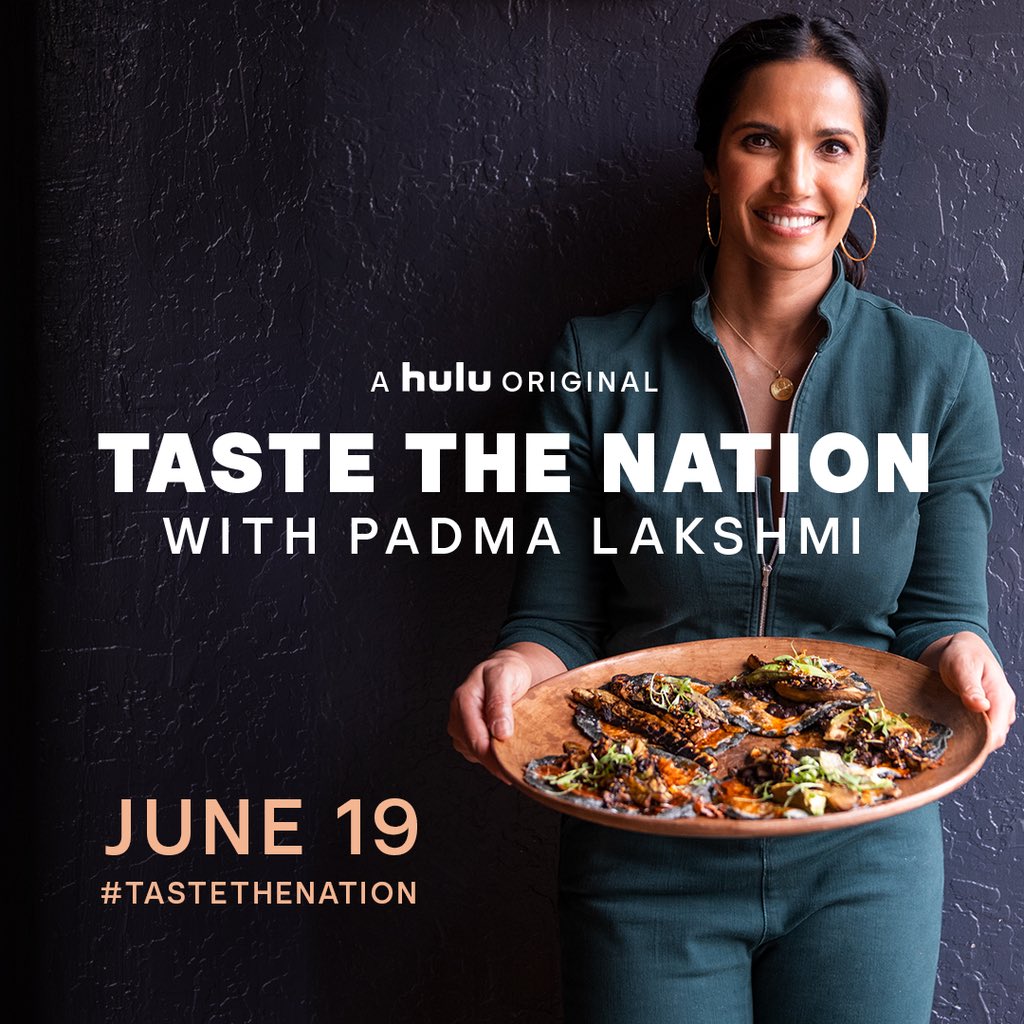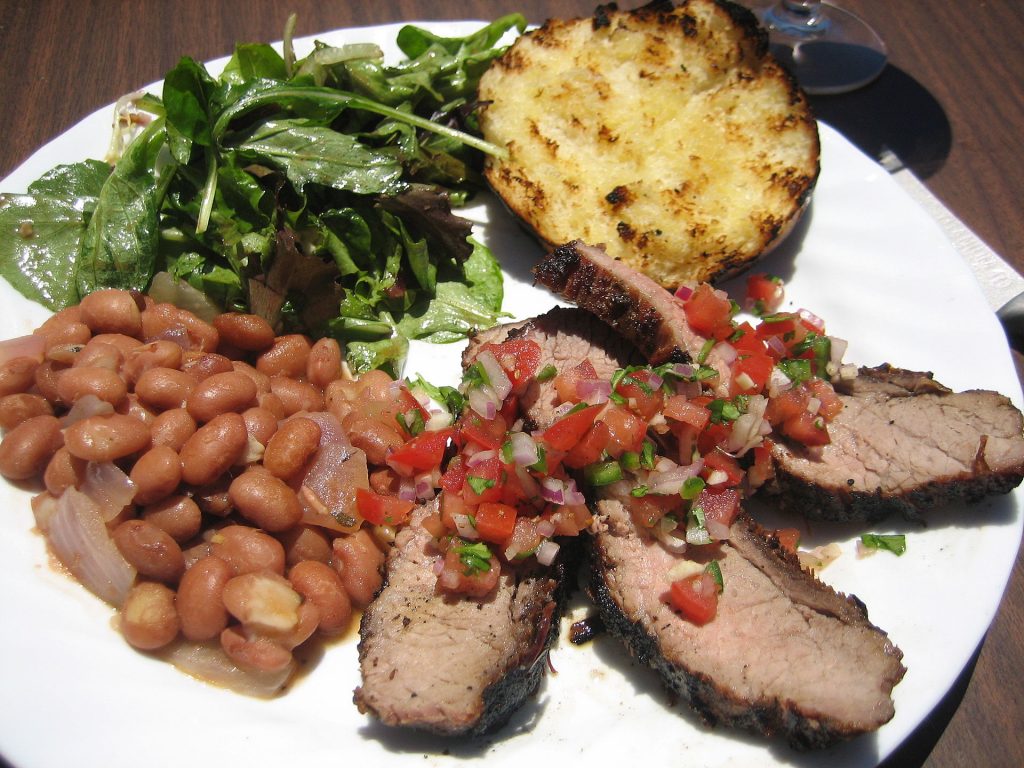
I was watching Padma Lakshmi’s Taste the Nation, and it really got me thinking about food as culture, food in community, and food as family bonding.
I asked the folks in the Lean and Strong Book Facebook Group: Do you have certain meals that always connect you to culture, commits, or family? And, it’s a cool thing for you to reflect on right now.
I know, for me, I grew up on the Central Coast of California. The Central Coast is all about “Santa Maria Style Barbecue,” but we of course just called it barbecue.
It’s tri-tip steak with a salt and garlic rub, usually cooked in huge metal drums. It’s served with salsa (usually on the steak), garlic bread, piquito beans (like pinto beans), and ice-berg lettuce salad.
It was the traditional end of the year celebration food in the California Ranchos.
When I was growing up, it was at every Farmer’s Market (a big deal in my town), at every Harborfest, Bayfest, and Oktoberfest.
I was really poor, so mostly I had it at the end-of-season sports banquets (I ran track and cross country). So, to me it seemed extra special. It was totally festival/celebration food, and I always had it with my friends. Most of my friends and I sort of became each other’s adopted families, and those meals together were really important.
So, Santa Maria Style BBQ has a special place in my heart. When I make it now, here in Colorado, it still reminds me of being back home, hanging out my friends.

Eating shouldn’t always be goal oriented
It’s important for you to remember that food isn’t always goal oriented. That’s why perfectionist diet rules always explode — sometimes what the meal is about is connecting to our people and past.
We need to have the skills to be able to make different food choices in different contexts. We need to be able to consider all of the areas of our lives that matter to us, including fitness, family, career, education, spirituality, community, social life, or whatever else.
While there are likely certain frequencies of meals that do or don’t align with our goals, that doesn’t mean we should ever set a frequency rule. We don’t want rules, because they make it so we can’t make decisions in context. Making decisions in context is the whole deal.
Like, it doesn’t make sense to have an unbalanced meal on Tuesday, because “Tuesday is my free day.” But it could make sense to have an unbalanced meal on Tuesday because your son or daughter made dinner for you. You want to be the kind of parent who can just eat Mac&Cheese because your kid was happy to make it for you, and right then that matters more than “having a perfect meal.”
Similarly, we don’t want to get into “free day” or “free meal” territory, as rules always do. If I have Santa Maria Style Barbecue, I’m still going to put my fork down between bites, enjoy what I’m eating, and not get seconds and thirds just because. I’m totally going to enjoy it, but I always want to feel good after. It’s usually a social thing, and I don’t want to feel like I have to take a nap afterwards!
There are lots of areas of life that matter to us.
The goal here is to be healthy. And social connection, connection to culture, and connection to history are all good for our well-being.
I realize that making decisions in context might require a full system of guidelines and skills, and repeated reflection on your personal values around those different areas of your life. So, I’m not minimizing the difficulty of what I’m saying. But you definitely want to consider that practicing that kind of flexibility — considering your values in the moment — is worth putting the time int.
Some Questions You Can Ask Yourself
- Is this meal social?
- Does this meal connect me to my culture or community?
- How frequently do I have this?
- Is this a special occasion?
- What are my personal values around eating?
- What other areas of my life also really matter to me and should factor into this decision?
Don’t think you need to ask yourself all of those. Maybe you ask one or two.
If my grandma were still alive, and I was at her house while she was making spaghetti dinner, I’d eat her spaghetti dinner every time. My grandma was 100% Italian and made this simple but wonderful food that tasted like the history of my family. She used oregano from an oregano plant that my great grandmother brought over from Italy a hundred years ago.
This kind of connection really matters. Don’t let diet rules separate you from that connection. Practice asking yourself questions, reflecting, and making decisions in the context of the situation and all of the areas of your life that matter to you.
Watching Taste the Nation really got me thinking about how food connects people. Watching a couple episodes might inspire you to look at food in that way again, if the diet world has distracted you from that in the past.
By Josh Hillis
Author of Lean and Strong: Eating Skills, Psychology, and Workouts
Creator and Head Coach: GMB Eating Skills
My personal anti-racism plan
I love how you speak about adding context and meaning to our food and it not being a tool for an outcome. I think changing that meaning means it connects us to our values. And as I am learning in your book the more we express the person we want to be by living out our values, the outcomes of that will be expressed in the way we want to be physically as well. What a great topic! Thanks Josh!
Funny to stumble on this particular blog entry after a long and winding tour through the interwebs! For one thing, what you’re saying here has been my philosophy around food for years, yet I’ve almost never heard it replicated. I came to these conclusions after learning about the horrors of factory farming and hanging out with animal right activists, as well as going through a “health coaching” certification program where I encountered plenty of dogma. Currently, I’m exploring sugar addiction while trying to avoid rigid rules… tricky. Somehow or another, that led me to you. But the other thing is, I grew up in Santa Maria! Did NOT expect to see tri-tip in the middle of this article! I still remember driving down Broadway on the weekend and that drool-inducing smoke coming into the sealed-up car for blocks and blocks. What an odd thing that seemed normal at the time. Health code orders mandate running water for food operations now, so those parking-lot fundraisers are a thing of the past. Thanks for bringing a smile to my face!
Whoa that’s cool you’re from Santa Maria!!!! Yeah, I remember tri-tip at every farmer’s market, at the Oktoberfest in Baywood, even at the dinners for the Track Team at Morro Bay High School! It seemed like such the normal thing. It’s hard to imagine that they don’t do that anymore. I mean, I can understand how running water is necessary (handwashing is important LOL), but I’d so totally miss that.
Sugar addiction is a really interesting topic. I had an addiction studies professor who looked at any kind of loss of control and inability to stop (regardless of unwanted consequences) to be addiction-like. My own experience with clients is that most of the ones who felt “addicted to sugar” were just using it as a way to numb emotions. It had slowly, over time, become their go-to tool for coping with distressing emotions or unwanted thoughts.
Don’t get me wrong, sugar+fat is also really delicious LOL. Like, humans love eating sugar+fat. So, it makes sense to eat that sometimes, because dessert is rad.
In that way, the sugar wasn’t the issue. The issue was, ultimately, learning ways to be with uncomfortable emotions. Part of that is usually normalizing feeling bad. My addiction studies professor said “Humans aren’t wired to feel ‘up’ all of the time.” Next, we look at non-food ways to soothe and for self-care. Most importantly, though, we work on tools (like cognitive de-fusion) for learned to be with hard emotions, without having to fix or change them.
The thing is, the combination of sugar and fat is AWESOME for numbing out stress, emotions, tiredness, procrastination, all kinds of things. It really really works. It works fast. It’s easy to do. It totally works. So, that’s a big part of why it’s so compelling. Addressing it with self-care and/or de-fusion is an enormous amount of work in the beginning. It’s a skillset that has to be built, and that can take a few months.